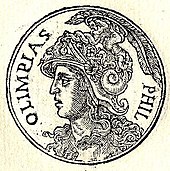Olympia of Epirus
Olympias (Greek: Ολυμπιάδα, Ancient Greek: Ὀλυμπιάς) (375 BC - 316 BC) was the principal wife of King Philip II of Macedon and mother of Alexander the Great. She was the daughter of Neoptolemus I of Epirus, king of Molosia, in the Epirus region of northwestern Greece.
Not many surviving writings about the life of Olympias exist. Historians have had to select from the few fragments that have come into her hands. But there is a legend spread by her enemies, especially by the greatest of all, who was Cassandro. Olimpia did what other kings of her time did, that is, she carried out a policy of eliminating possible rivals.
Biography
Her maiden name was Polyxena, in honor of the young woman thus named, daughter of Priam and sacrificed in the tomb of Achilles. She changed her name to Myrtale when she married Philip, as part of her initiation into a mystery cult, and later changed it back to Olympias, in memory of Philip's victory at the Olympic Games, and what happened. the same day his son Alejandro was born. Over the years he changed his name again to Stratonice, in honor of the victory obtained in defense of his grandson Alexander IV against his rival Eurydice in 317 BC. C. (which was an ally of the successors of Cassander of Macedonia).
Family
Olympias had two children with Philip: Alexander, in 356 B.C. C. and Cleopatra of Macedonia, in 353 BC. C. These children were educated along with the other children of the court: Karono and Arrideo (sons of Philip and other women), Amyntas, Philip's nephew, Europe (daughter of his last wife, the young Macedonian) and Cleopatra, niece of Tie it. Her brothers were Troa of Epirus and Alexander of Epirus.
In all likelihood Alejandro was still very young when she implied that Philip was not his father. Later events show that whatever mystery Alexander believed surrounded his birth, he considered it supernatural.
In those days, daily life enjoyed little privacy, even in the case of adults. That is why it was significant that, despite the accusations Olimpia provoked, no one was ever mentioned as her lover.
It was repudiated by Philip II in 337 B.C. C. and in this way she went from being queen to being only the mother of Alexander. She went into voluntary exile in Epirus, her native region. She only returned to Macedonia when Philip died the following year, in 336 BC. c.
Intrigues
According to Plutarch, Olympias kept around her the tame snakes of the early Thracian cult. It is possible that she suffered from self-induced hallucinations. Plutarch describes that, the night before the consummation of her marriage, Olympias dreamed that lightning struck her belly, and kindled a great fire. After the marriage, Philip also dreamed that he put a seal on his wife's belly, which contained a picture of a lion. Aristander's interpretation was that Olympias was pregnant with a son, whose nature was like that of a lion.
She is one of the main suspects in the death of Philip II, due to the repudiation of which she was subjected and also due to the fact that the new marriage of Philip II, with Cleopatra Eurydice, and therefore, a new son of this could make jeopardize the future reign of Alexander. From that moment on, his life becomes involved in political intrigues and murders. In the first place, he ordered the assassination of Philip's last legitimate wife, a fact that was highly reproached by Alexander, his son. Despite these turbulences, it seems that it was the best time of his life, since he felt important as regent of Macedonia, without anything getting in the way. But he had an eternal enemy: Cassandro, who managed to destroy her.
When Olympias had Eurydice II and Philip Arrideus (king of Macedonia after the death of Alexander the Great) assassinated, Cassander, his eternal rival, revolted part of the people against her and finally had her executed.
Cassander had no opposition from the Macedonian soldiers. He ordered them to execute Olympia, but they refused, claiming that they would never kill the mother of their mythical boss Alexander. After this failure he tried to gain ground by slandering and slandering Alexander. But the Macedonians did not agree with this behavior and began to withdraw their support from him. The memory of the great Alexander still weighed heavily.
It was then that Casandro hatched a whole plot: he went to the relatives of Eurydice (wife of Filipo Arrideo, who had been murdered by order of Olympia), who were all against her. And so with the help of some angry and feuding relatives, Cassander achieved the death of Olympia in the year 315 B.C. C.
Olympia in the cinema
- In the 2004 film Alexander the GreatOliver Stone, Olympia's character is played by Angelina Jolie.
- In the 1956 film Alejandro El Magno, by Robert Rossen, the character of Olimpia is played by Danielle Darrieux.
Contenido relacionado
Camana Province
Genealogy
Virgilio Leret

